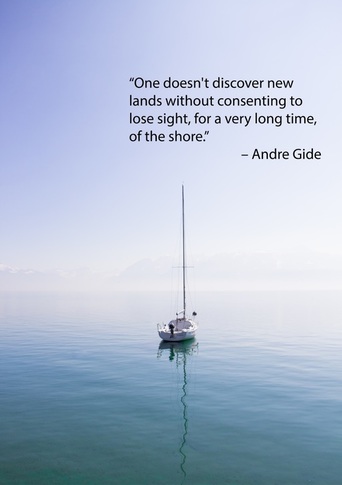 By Kate One truth I’ve known about myself since childhood is that I write in order to understand the world. When my soul threatens to break under the weight of a question, I set out like an explorer—with my pen as my boat and the blank white page as the open seas, with little knowledge of where I may go and praying to find new land. When we started writing BIG WORK, I didn’t know what we would learn specifically. I just knew that I had recently turned 30 years-old, that I was already dangerously close to being a workaholic and I didn’t know why, and that the weight of trying to figure out where work was supposed to fit in my life threatened to break me. So I set out, although this time not alone. I would quickly learn that writing with a partner and having long conversations with interviewees were critical pieces of navigation equipment missing from other voyages. Before Melissa and I interviewed others, we interviewed each other. We sat down with a tape recorder and asked each other the thirteen questions. Listening to the recording of my interview, it became clear that for me illness and work were inextricably linked. I was sick for the first 25 years of my life, and my biggest goal growing up was not to become dependent. I couldn’t wrestle with the question of the role work played in my life without also getting curious about how an unresolved legacy of illness was still shaping me. Picking this apart took 18 months of interviewing and writing. There were many stepping stones along the way, but the moment that stands out happened while I was interviewing Safiya, an aerospace engineer born in Pakistan. She talked about having grown up in four different countries, and about being one of only a few women and a few Muslims in her field. The more her story twisted and turned, the more I saw the expectations and complications from her many identities swirling. Every detail of her story seemed to speak of constant change. And yet, it was, in many ways, one of the most lighthearted interviews I did—because she LOVES what she does. She said, “I get to send stuff to space!” no less than a dozen times during our conversation, grinning widely each time. The little girl she described to me who loved science had grown up to be a scientist. It was the thing that never changed when everything around her did. I’ve always feared that I am who I am and that I do what I do because I was sick. That I’ve made all my choices based on my limitations, real and perceived. But talking to Safiya inspired me to ask myself what hasn’t changed for me since childhood, and I came up with two things: I’ve always been curious and I’ve always been a storyteller. As a young girl, I begged my teachers for extra homework, and was quick with a question for everyone I met. And at four years-old, I would ask my mother to write down the stories I made up because I wasn’t old enough to write them myself. I’ve seen my work and my life through a lens of illness for so long, that I never stopped to realize that I work in a day job—communications—where I’m paid to ask questions and tell stories. And suddenly all the seemingly disparate parts of my life—the communications manager, the nationalism scholar, the tanguera, the traveler, the playwright, the friend—were linked and made whole by the oldest truth of my life, I am a curious storyteller. I am a grown up version of that four year old little girl. I don’t know what this means moving forward, but understanding this about myself has allowed me to like my work more and to need it less, to find more balance, and to have a deeper understanding of my life. I believe in the power of story to heal. Writing BIG WORK showed me how connected my life is to strangers and friends alike, and how telling our stories can make us feel more connected to each other. It reminded me that the stories we make up about our lives can be treacherous, but that we can reframe them and write new endings. And it reminded me that wading into the murky, black, uncharted waters of our story can be frightening, but it can also be our salvation. In the process of writing BIG WORK, I found new land. One day when we were nearly finished with edits and getting ready to cast our first workshop reading, I went out for a walk near my house. I wasn’t even thinking about the play when I heard an unexpected voice creep up from deep inside my heart and say, “This is the last thing I’ll ever write about being ill.” I stopped for a moment, caught off guard, and then I smiled. I think I knew it was coming. For so long, everything I wrote was about being sick or from this perspective. Because when the reason you write is to understand the world, and when something has taken over your life and you can’t understand it, and you’re trying not to feel it but you can’t let go of it, it creeps into everything you try to write. That voice I heard on my walk wasn’t a declaration or a promise of future behavior—I may write again someday about that part of my life. But what the voice was telling me was that I don’t need to answer that question for myself anymore, just like I don’t need to answer the question about work anymore. I am satisfied with how that part of my life fits into my narrative now. It is integrated. I carry it with me, but it rides in the back seat; it doesn’t steer. And because of that, I can be curious about other things and wrestle with new questions on the uncharted waters of a new blank page.
0 Comments
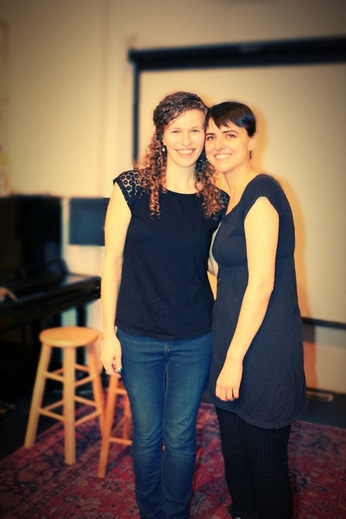 Melissa and Kate after the first reading of BIG WORK. Melissa and Kate after the first reading of BIG WORK. By Kate and Melissa Love, gratitude, and unabashed joy—the overwhelming emotions coursing through us ever since the workshop readings of BIG WORK wrapped almost five weeks ago. When we sat down to make the list of questions for the BIG WORK interviews, we asked ourselves what we wanted to get out of this experience. We said that “a win” was writing the play, taking the journey at all, and that if even one person saw it, it would be the icing on an already rich cake. So the fact that the show played to four sold out crowds and that there was a hearty waiting list, is more than we dreamed of when this all began. THANK YOU. Thank you to everyone who came and who traveled far distances to be there, to everyone who sent us a note or an email, to everyone who called or texted with messages of support, to everyone who donated months ago to our crowdsourcing campaign, to the amazing actors who breathed life into these stories, and to everyone who cheered us on from the earliest declaration that we were going to write this play. We’ve marveled to one another over and over again that we’ve never felt so loved in our lives as when we dared give voice to this dream, and then watched as the people in our lives as well as strangers embraced that dream alongside us. We expected to be told we were crazy, or that this conversation about the work that we do and the lives we create in the process wasn’t worth having. But this experience has been proof that we are all looking for opportunities in our own lives to dare greatly, to be authentic, to be vulnerable, and to say, “Why not?” If there was any larger purpose to this particular play, it was simply to start a conversation about how we see each other because of the jobs we have, and about the ways we all wish we were seen. Nothing was as rewarding as the talk backs with the audiences after each performance. Just as the characters in the play represent a variety of cultures, careers, and perspectives, our audiences were diverse as well: surgeons, artists, therapists, retail workers, and at-home parents. People shared which characters they identified with, the questions that the play asked of them, and ideas for creating a new language that encourages curiosity about the people we meet, in more ways than just how a person earns a paycheck. It’s a conversation we are committed to continuing. The toughest question we were asked at the workshop readings was, “What are you doing next?” It was asked with enthusiasm and with genuine interest, but it is also a tough question for a two-person theatre company run by people with day jobs. The pressure (including and perhaps most acutely the self-inflicted pressure) to always have something tangible to show for your work can be overwhelming. But we’ve had to take a deep breath and accept that as much as we want to capitalize on the momentum of our workshop readings, we don’t have capacity to always have something on stage. And we got in this to tell the stories that we find compelling – that’s how we pick our projects, and they take as long as they take. In this way, we are daring to see ourselves as more than the work we produce as theatre artists and storytellers—a lesson from the many voices of BIG WORK itself. But that doesn’t mean we aren’t always creating. Our goals for the next year are to bring BIG WORK to a full production, and to embark on our first “pop-up play” that responds to a real event in real time. We hope you will continue to share in these discussions and this journey with us. Our blog will stay active while we are in the creation process – sharing what is coming down the pike and also more insights from BIG WORK. We are excited to talk about the ways each of us has been personally and forever changed by writing this piece, and also how audiences reacted to the show. We did an anonymous survey of everyone who came, and we are particularly excited to share their answers to the question, “What three words describe how you feel after seeing BIG WORK?” Waiting five weeks to say thank you to this beautiful community of Visitors for all of your support might make it seem like we aren’t bursting with love, gratitude, and unabashed joy, but we are, more than words can say. But these feelings were also accompanied by a hearty helping of exhaustion from being our own crew, box office, prop mistresses, promoters, and directors. And after months of going nonstop, these two introverts needed a chance to cook and eat well again, sleep again, dance again, and get lost in the pages of a book again. And honestly, it has been nearly impossible to articulate that love, gratitude, and unabashed joy. It sneaks up on us in the most unexpected of moments and knocks us completely over. We’re not sure we’ll ever be able to express what you’ve given to us; we can only hope the play has given some small piece of that back to you. 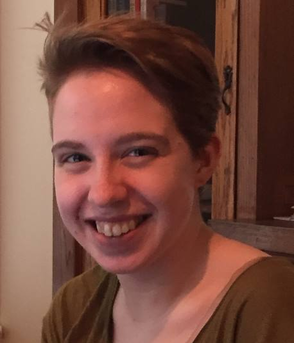 In the final installment of our “Meet the BIG WORK Cast” blog series, we introduce you to Emily Duggan, the amazing writer and performer who plays Jill, James, Safiya, and Tim in the show. VISITORS: What drew you to BIG WORK? EMILY: I had only recently been introduced to the concept of documentary theatre when I stumbled on the Perpetual Visitors' online casting call. In my personal writing and performance, I have long been interested in how the art of storytelling shapes the future of the past narratives it recounts, how the act of storytelling influences the way we will experience and have experienced those stories. The spontaneous decisions of the unrehearsed personal storyteller have also been something I come back to again and again in my writing -- how ideas occur to someone in the moment, and how they then choose to express or omit those ideas; where they pause, where they speed up; their various choices in diction, etc. In short, documentary theatre was something I should have found out about a long time ago. VISITORS: What's your philosophy about the role work should play in your life? EMILY: I'm still trying to figure this out. If I could make someone's life a little lighter for a little while, and do that for a living -- that work would be the most meaningful for me. VISITORS: What attracts you about working in theatre? EMILY: I've been performing since I was a child, and I've always loved getting to tell someone else's story for a little while. VISITORS: You're hosting a dinner party. Which 3 people do you invite, alive or dead? What do you serve for dinner? EMILY: I agonized over this question for quite some time. At this point, I think I'd invite three of my four late grandparents (they'd have to decide amongst themselves who has to wait for leftovers), all of whom passed away before I graduated high school -- so I could meet them in an adult capacity, and learn their stories firsthand. My paternal grandmother would bake us a a pie. VISITORS: If you were going on the one way mission to Mars, what 3 things would you bring with you? EMILY: 1) A sketchbook. 2) A notebook. 3) Glitter pens! (No erasers. On Mars, there are no mistakes.) -- ICYMI: Check out the previous cast Q&As with the play's writers Melissa Bergstrom and Kate Marple who play themselves; Teddy Crecelius who plays Marvin, Jack, and Tricia; Sumit Sharma who plays Dana, Sam, Omari, and Adewale; and Christa Brown who plays Rachelle, Kevin, and Megan. 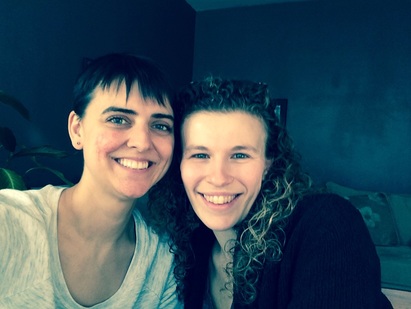 Left to right: Kate Marple and Melissa Bergstrom Left to right: Kate Marple and Melissa Bergstrom In Part IV of our “Meet the BIG WORK Cast” blog series, we check-in with the play’s writers and directors Melissa Bergstrom and Kate Marple. Both writers play a version of themselves in the show as they re-create behind-the-scenes moments from their interviews with the characters. Melissa also plays Helen, Remy, and Paul. Q: Why did you want to write BIG WORK? MELISSA: As an actor and writer (with many day jobs mixed in), the answer to the classic, “What do you do?” question has always been complicated. I used to tell people “waitress” or “administrative assistant” or whatever I was doing to pay my bills at the time, but none of those things felt authentic. One day I said, “I’m an actor and I write too,” and I felt like a fraud. I always feared that the person would (and sometimes did) ask if I made money doing those things, or demand proof that I was telling the truth, and what was I going to say? It occurred to me that perhaps other people felt this way too, and the more I looked for people wanting to talk about this thing we call “work”, the bigger the conversation felt. It took a long time, but I’ve gradually gotten comfortable defining myself as an artist. A huge part of that journey for me was creating this play. KATE: I was sick for most of my childhood and the first part of my 20s, and one of the main effects this had on me was that I became someone who was really focused on work – as a way of contributing to the world and as a way of distracting myself. When I got healthy, I really started to struggle with the questions that the play struggles with – about where work was supposed to fit in my life and what it was supposed to mean, about how much of it is who I am versus what I do, and about how people see me because of the work I do. And the more people I talked to in my own life about it, the more it felt like I wasn’t alone in wrestling these questions. I wanted to try and wrap my arms around what I was feeling, and the only way I know how to answer anything is by asking a lot of questions of a lot of people, and then trying to write my way to an answer. Q: What's your philosophy about the role work should play in your life? MELISSA: I have different definitions now for “job” versus “work,” or a “vocation.” My “jobs” may change over the years, and are what help me pay my rent, my grocery bill, and my student loans. And yes, they help finance my creative endeavors. My “work” in this world is as an artist and creative – it’s a constant throughout the different seasons of my life. At various times in my life, these two definitions have overlapped and crossed paths, but I’ve come to understand they are two completely different things for me. And that realization has made all the difference. KATE: It’s changing. I’ve lived through moments where I wanted to work all the time, and where I thought my biggest contributions to the world would be left through my job. I still want my job to be an outlet for my curiosity and something that I bring value to. And I’ll never be someone who says work isn’t a big and important part of my life – I want it to be – but now I am figuring out what else I want, how it all fits together, and when it’s okay to stop, say no, and take a breath. And the older I get, the more I’m convinced that in work, like all things, it’s less important what I’m doing, than why I’m doing it and who I’m doing it with. Q: What attracts you about working in theatre? MELISSA: The theatre invites all of us to a space in which to experience, talk about, and process our “big feelings” – joy, heartbreak, love, fear, anger, and hope. Stories are much more powerful than most of us can imagine, and there is no limit to what kind of understanding and compassion can be fostered when we share our story with others, and in doing so, give them permission to do the same. I believe that this kind of vulnerability is the key to connecting with other human beings, and it allows us to work towards peace in the face of violence, fear, and mistrust. To take part in the theatre, as an actor, playwright, or audience member, is to agree to take all the less than perfect parts of our own experience, and forge something meaningful from them that everyone can benefit from. KATE: There are so many things I love about the theatre, but what I love about writing for the theatre is that the audience has an impact on the story as it unfolds. Who shows up and how they react to the play influences what the story becomes on any given night. And as a writer, there is almost no other environment where you get to witness the relationship of the audience to the story in real time. It makes writing – which is often an incredibly solitary act – a community experience, and to me, that’s the best possible outcome. I’ve always written as a means of connection, and that feels enhanced in the theatre. Q: You're hosting a dinner party. Which three people – alive or dead – do you invite? And what do you serve? MELISSA: Louisa May Alcott, Charlie Chaplin, and Elizabeth Gilbert. I’d skip dinner and go straight to pies – pumpkin, strawberry rhubarb, and chocolate coconut cream. KATE: I’d invite storytellers I love from whom I want to hear more stories – journalist and author Slavenka Drakulić, folk Cellist Ben Sollee, and author Maya Angelou. Although, writers (myself included) tend to be introverts, and it does give me pause. But as long as we skip the small talk, we should be fine. The season determines the dish. As it’s currently winter, I’ve got to go with a stew. Q: If you were going on the one-way mission to Mars, what three things would you bring with you? MELISSA: Can I count my husband and our cat as a 2-for-1 package, since he’d hold our certainly spooked cat the whole ride there? If so, the other two items would be an iPod full of my favorite music, and a never-ending pumpkin pie. KATE: Enough meds to knock me out for the trip. I get sick on merry-go-rounds, and I’m afraid of heights…not sure I’m Mars material. Lots of paper and pencils. Writing on computers is a poor substitute to holding a real writing instrument, and I’d miss the smell of paper. Audio recordings of my favorite books read by my friends and family members – two birds, one stone. -- ICYMI: Check out the previous cast Q&As with Teddy Crecelius who plays Marvin, Jack, and Tricia; Sumit Sharma who plays Dana, Sam, Omari, and Adewale; and Christa Brown who plays Rachelle, Kevin, and Megan. And stay tuned -- we've got one more conversation with cast member Emily Duggan coming next week! 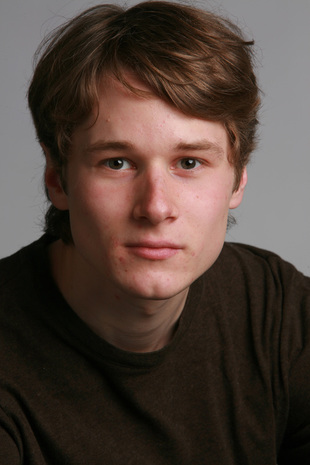 In the third part of our “Meet the BIG WORK Cast” blog series, we introduce you to triple threat -- writer, director, and performer -- Teddy Crecelius, who plays Marvin, Jack, and Tricia in the show. VISITORS: What drew you to BIG WORK? TEDDY: I stumbled across the online audition notice while looking for new contacts and potential collaborators in the Boston theatre community. Kate and Melissa looked like a team I would enjoy working with who share many of my theatrical interests. VISITORS: What's your philosophy about the role work should play in your life? TEDDY: This is an interesting time for me to answer this question, because I have always dreamed about devoting almost all my time to working on projects I love. But now I find myself wishing most for peace and balance, a job that I can leave behind when I am not at work. When I devote all my time to organizing my career, I feel like I am surviving, rather than living. VISITORS: What attracts you about working in theatre? TEDDY: Rather than recite my artistic manifesto here, I'll just say I keep doing theatre because I feel there is always more for me to do that I haven't done yet. VISITORS: You're hosting a dinner party. Which three people – alive or dead – do you invite? And what do you cook? TEDDY: At first I thought I would name people from history that I have a lot of curiosity about -- like Jesus, Abraham Lincoln, or Antoine De Saint-Exupery -- but I don't want to feel like I am somehow unlucky because I live now, rather than when I could have met these people. So I will stick to the living: Queen Elizabeth (because I'm just so curious what someone like her would be like in a small group), Thaksin Shinawattra (because I want to know the real story there), and Michael Moore (because he would bring a totally different perspective to the evening from the other two, and I wouldn't be the only person there who doesn't come from money). I would serve something with no possibility for embarrassing splatter. VISITORS: If you were going on the one-way mission to Mars, what three things would you bring with you? TEDDY: It may be corny to say so, but I literally could not step onto the ship without my wife (although I feel bad classifying her as one of three pieces of luggage). Apart from that, I would choose two real books -- the idea of living entirely through a screen sounds bleak. -- *We love what Teddy is bringing to the characters of BIG WORK, but there are so many other amazing things he's up to a writer, director and performer. Check out his website: http://www.teddycrecelius.com/index.html **ICYMI: Check out the previous cast Q&As with Sumit Sharma who plays Dana, Sam, Omari, and Adewale, and with Christa Brown who plays Rachelle, Kevin, and Megan. And stay tuned -- we've got two more conversations with cast members to go. 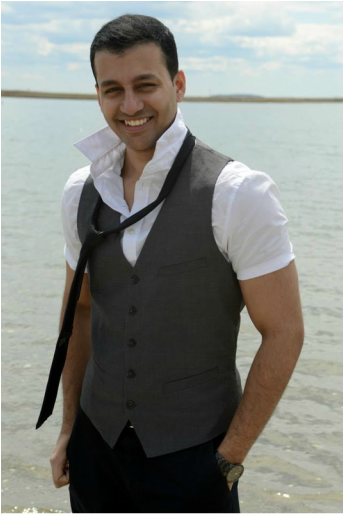 In the second part of our “Meet the BIG WORK Cast” blog series, we introduce you to the über talented Sumit Sharma, who plays Dana, Sam, Omari, and Adewale in the show. VISITORS: What drew you to BIG WORK? SUMIT: The biggest thing that drew me to this project is definitely the questions that Melissa and Kate asked people. I often find myself asking many of these questions, especially the one, "Where do you draw your sense of self in life?” I heard about the audition literally a day before from someone at work, and came home and started reading about it. I felt an instant connection, and emailed them asking if they can meet me at such short notice, and they DID!! VISITORS: What's your philosophy about the role work should play in your life? SUMIT: I think work should and does play an important role in my life. It is something that I do for 8 - 9 hours a day so, it has a pretty significant impact on my life. I feel work in my life is like salt in my cooking. Too much or too little and the dish is ruined. It has to be just the perfect amount. VISITORS: What attracts you about working in theatre? SUMIT: Oh gosh, where do I even begin? Acting to me is basically an expression of emotion. In TV and movies, this emotion is refined and processed to make it close to perfect. In theatre, it is raw; there are flaws and there is this connection with the audience that is just fascinating. It's a very powerful feeling that makes you forget everything else in your life when you are rehearsing, running lines with your fellow actors, and when you are finally on the stage performing. VISITORS: You're hosting a dinner party. Which three people – alive or dead – do you invite? And what do you cook? SUMIT: I would invite, Ed Sheeran (he would probably leave early because of my never ending song requests), Bruce Lee (to solve the mystery surrounding his death), and Angelina Jolie. I would cook eggplant with some garlic naan. VISITORS: If you were going on the one-way mission to Mars, what three things would you bring with you? SUMIT: The 3 things I will bring with me are........A guitar (to play some tunes on my way), my pillow (I like a certain kind, and I am not sure if Mars got a similar one), and my home movies (to remind me of my days on Earth). -- *ICYMI: Check out last week's Q&A with Christa Brown who plays Rachelle, Kevin, and Megan in BIG WORK. And stay tuned -- we'll be posting a conversation with a different cast member each week.  We’re fortunate to have five amazing Boston actors bringing the characters of BIG WORK to life. In the first part of our “Meet the Cast” blog series, we introduce you to the fabulous Christa Brown, who plays Rachelle, Kevin, and Megan in the show. VISITORS: What drew you to BIG WORK? CHRISTA: I loved the idea that it tackled something that I was going through currently – finding that balance between pursuing my artistic endeavors while simultaneously wanting to be fulfilled in the "workplace." It's something I related to intrinsically, and I was immediately drawn to it and wanted to be a part of it. I feel like the opportunity presented itself at the perfect time in my life. VISITORS: What's your philosophy about the role work should play in your life? CHRISTA: A part of me believes that work should add to your life and that you should be a little fulfilled, passionate about your work, and feel energized on a Monday morning. The other side of me believes that working in your passion is the only way to be whole. The OTHER part of me believes in balance, that through your work you can achieve a whole different level of personal growth that you can’t find in your passion and vice versa. I also believe that people can be genuinely fulfilled in their “jobs.” As of now, I am reveling in the balance I have found between my career and acting. I feel like I can pick and choose the roles I want to go for, and am also going through a really cool growth experience at work. VISITORS: What attracts you about working in theatre? CHRISTA: The sense of community about bringing universal issues and ideas to life. There are so many universal things that human beings experience but for whatever reason, we don’t talk about them. Theatre makes it okay. Theatre brings people together from all backgrounds and experiences and for a moment the world stops. It’s just you and the play, living through the words, bringing forward the truth; it is therapy for me. Theatre has helped me cope. It’s given me sisters, and has helped me grow in ways that I can’t explain. I found my voice, my niche. VISITORS: You're hosting a dinner party. Which three people – alive or dead – do you invite? CHRISTA: Viola Davis, Jill Scott, and Elizabeth Gilbert. #swoon VISITORS: If you were going on the one-way mission to Mars, what three things would you bring with you? CHRISTA: Someway of being able to watch TV or Netflix. A crap ton of blankets. And a cellphone with super big WiFi range so I can talk to my Earth buddies. #Mars #Outtathisworld 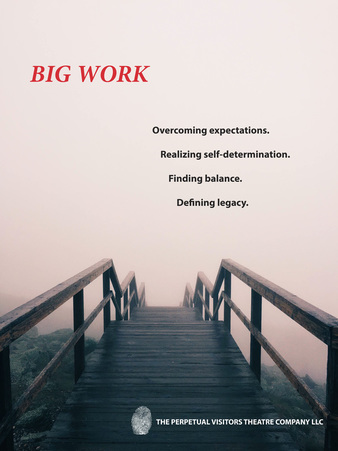 By Kate Ask any writer and they will tell you they become attached to their characters. But documentary work adds another layer to it. When you’ve sat across the table from someone who has opened up to you about their lives, choosing not to include what they’ve told you in the piece you’re writing feels like you are somehow saying her story is less important than someone else’s story. Transforming the 138,097 words from our interview transcripts into Big Work, a 16,000 word dramatic piece, has led to incredibly tough choices about what material to use and what to let go of. Essentially, we could use only 10 percent of the stories we collected in our final piece. Sometimes this meant letting go of a moment or observation we love; other times it has meant not including whole interviewees as characters. And while Melissa and I know having too much good material is a much better problem than not having enough, the cuts have been surprisingly painful. But we can’t ask an audience to sit through a 12-hour play, and the piece as a whole needed direction and cohesion in addition to containing great individual stories. Here is how Melissa and I went about choosing what to include. 1. We asked ourselves, “What is each interviewee’s core struggle with work?” Before we started writing the script, we spent several weeks just reading and re-reading every transcript. While each interviewee shared complex feelings about their jobs in relationship to their lives and their identities, each person seemed to have one thing they were wrestling with above all else. We challenged ourselves to try and name the struggle for each interviewee in one word. When Melissa and I met to discuss the words we had chosen, we discovered that some of the themes we initially set out to examine in relationship to our work – gender, age, immigration status – were too narrow. Instead we saw people, regardless of those labels, struggling with one of four things: to overcome expectations, to realize self-determination, to find balance, or to define their legacy. Naming these struggles not only helped us to understand who our characters are, they also provided the structure for our piece. These themes became the scenes of our play. 2. We eliminated everything that wasn’t directly related to a character’s core struggle or essential biography. There was a man I interviewed from Nigeria who told me so many fascinating stories about what it is like to be an immigrant working in the United States, and particularly the ways he feels an immigrant approaches college differently than American-born students. I loved these passages, and was reluctant to let go of them. But when I started asking myself about what he was really concerned with, it was clearly his legacy. When given the chance to direct the conversation, he spoke about trying to find work that is meaningful and that leaves something behind. He had only spoken about being an immigrant because I had asked him directly about it multiple times. I’m working on a play that asks people how they identity themselves, but I was labeling him and asking him questions that weren’t particularly relevant to his journey. By keeping only what was at the heart of each person’s struggle, we eliminated a lot of anecdotes. But more importantly, we have clearer, richer characters engaged in more meaningful discussions with one another. 3. We looked for characters who offered similar stories. There was no way to include meaningful characters based on all 40 people we interviewed without this being a series and not a single piece (which we considered). After we re-read the transcripts, we found that several characters were wrestling with the same things, had similar biographies, or articulated similar frustrations and triumphs. Melissa and I look at each of those stories and see their value. We see the individuality of the person who told it, and we took a lot away from having heard each one. But for the sake of drama, our global story didn’t need two characters saying the same thing. So we eliminated duplicates, and included stories from only 26 of our interviewees (which admittedly is still a lot). It can be a struggle for Melissa and me as we continue to tighten and hone our play because we know everything that didn’t make it into the final script. There are moments and stories we love that just didn’t have a home here, and we will always know they aren’t there. Hopefully, if we’ve done our jobs, audiences won’t feel those gaps. We’ve had to remind ourselves many times that we can use these interviews to create other pieces, maybe even a couple of 10-minute plays. But while these choices have been difficult, what has surprised us most of all is that we actually found the voice of this piece – really our voices – from the struggle to let go. It made us examine characters in more depth, ask tougher questions, and debate the themes that arose against our original hypotheses of what we would find. Shaping these interviews into a larger story about work and life in America has been an extraordinary journey, and one I wouldn’t trade for anything. We can’t wait for the next phase when we get to have these conversations with our actors, and then with you. 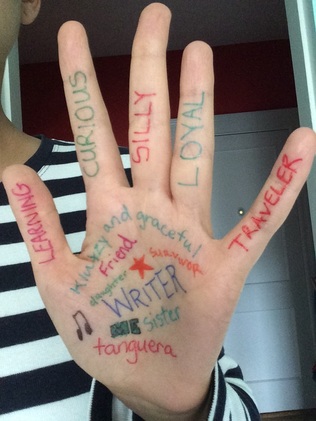 By Kate “HOW CAN I EXPLAIN TO THEM THAT IN THIS WAR, I AM DEFINED BY MY NATIONALITY, AND BY IT ALONE?...THE TROUBLE WITH NATIONHOOD, HOWEVER, IS THAT WHEREAS BEFORE, I WAS DEFINED BY MY EDUCATION, MY JOB, MY IDEAS, MY CHARACTER -- AND, YES, MY NATIONALITY TOO -- NOW I FEEL STRIPPED OF ALL THAT.” – SLAVENKA DRAKULIĆ, THE BALKAN EXPRESS Reading the diary Slavenka Drakulić kept during the Yugoslav Wars made me want to study nationalism. She captured beautifully and painfully how quickly our identity can be sacrificed to circumstance. Granted war is perhaps the most extreme example, but in small ways every day, our desire to define ourselves is in conflict with a world trying to tell us who we are. Religion was not a big part of my life as a child, but I grew up with an extended family that was deeply Catholic and in a town where almost everyone I knew was too. I remember being uncomfortable attending Mass during family reunions, and being told by one relative that I was probably going to Hell. I vividly remember a friend telling me she really struggled with my not being Catholic because “I feel like you are a really good person,” as if being Catholic and being a good person were mutually exclusive ideas. At many moments in my childhood, before I was anything else, I was “not Catholic.” The significance of the label was the otherness implied by those who spoke it. Religion was never a conversation about what I believed; it was one about what I didn’t. In many ways, it wasn’t a conversation about religion at all, and it certainly never extended to what was important to me. Now as a 31-year old woman, I find that the world is quick to label me in other ways – particularly that I am “not a wife” and “not a mother.” The questions I’m asked when I meet new people or get re-acquainted with others are repetitive and unimaginative. Sometimes, it goes further and people assign meaning to why I’m single and don’t have kids. They say I am career-oriented or that I’m selfish and trying not to grow up. Others offer pity or to try to comfort me, clearly ignoring the fact that I’ve expressed no sadness on the subject. Recently, I ran into an old classmate who asked me what was new. I talked animatedly for five minutes about dancing and the play I’m writing. When I finished, he said, “Cool. What else?” I shared a little bit about a recent vacation with friends. He nodded, paused and said, “Anything else?” And then I got it; it was just a less direct way of asking the same questions about a spouse and kids. The funny thing is that these labels – not Catholic, single, childless – don’t relate in any way to how I see myself or how I wish others saw me. To me those things are true, but largely irrelevant to my story. I am a writer – that is how I enter this world. I am a friend nestled in an extraordinary tribe. I am a tanguera. And I am a human inextricably linked to the lives of others. What Slavenka Drakulić was mourning in her journal was the loss of her individuality, of ceasing to be seen for the things that were important to her and instead being reduced to the sum total of what was happening around her. I don’t equate my experiences with hers, but I also haven’t met anyone who can’t identify on some level with that struggle. We measure each other against the way things have been and the way we are told things are supposed to be. We measure each other against the things that we fear and what we hope for ourselves. None of us are innocent of this instinct. But beyond all the real world dangers this can sometimes present, not allowing someone to share how they identify themselves deprives us all of connection. My favorite question we asked during the interviews for our American Dream piece was, “What question do you wish people would ask you?” Some people wanted to tell us about their children, others spoke of their jobs. Some people wanted to expound on a hobby or the trip they recently took. Some wished for an honest conversation about where they are from and how they got here. But by far, most people wanted to be asked, “What are you most proud of?” I’ve thought a lot about it, and the truth is there isn’t a perfect question I wish people would ask me, and I know there isn’t a single question that we’d all universally like to be asked. But my wish is that when someone asks me a question, she does it without a pre-determined idea of what the answer should be. That if she asks about my job or religion or family, she asks because she genuinely wants to know something about me, and not where I fit into her neat schematic of the world. By Kate and Melissa
When we started writing this piece about how our jobs influence the rest of our lives, we knew that we wanted to interview people of all sorts of backgrounds. We just didn’t realize how difficult that would be. We made a dream list. Men and women. College age people, those in their 80's, and everyone in between. People of different faiths. First and second generation immigrants. Middle class Americans and those earning minimum wage. People who lived in cities and those who lived in small towns. White, black, Latino and Asian individuals. With our list in hand, we reached out to our inner circles and canvassed for anyone that might be interested in participating. Then our circles began reaching out to their circles. Word spread. We had a solid start with fifteen interviewees, but after a month, we hit a wall. Our first responders, while diverse in their professions, experiences and personal stories, looked a lot like one another. So we started contacting professional groups for minorities, faith-based organizations, advocacy groups for at-home parents, recreational groups for seniors and nursing homes, groups for people who loved the outdoors, farming associations, and groups advocating for wage increases. We used Meetup Groups, Facebook, Twitter, and email to contact more than 125 organizations nationally, being careful to target rural communities alongside those in big cities. One by one, over four months, we followed each thread, securing interviews in person, by phone, and by Skype until we had forty people willing to participate. We didn’t reach every voice on our wish list, but we got 80 percent of the way there. In some ways, the voices we never reached and why is a story all its own. Here are four things we learned – about others and ourselves – while searching for interviewees. 1. Socioeconomic lines are the toughest to cross. The magic formula: Identifiable + Approachable + Willing = Interviewed. First, there has to be a place where a group of people who represent whatever unique characteristic you are looking to capture gather, online or in person. Once you find where they are, you have to be able to approach them. This means both that there is a means of contact (email, phone number, or a place to physically go), and that it is appropriate to show up. Lastly, if the first two are achievable, individuals have to be willing to participate. As hard as it can be to start a conversation across racial and religious lines, there were places where we could readily identify people by both race and religion, and critically where people self-identified by these characteristics as a point of pride, something that proved critical in a person’s willingness to participate. There were a large number of groups for minority professionals and minority students, and there were both places of worship and social meetups for people of faith that were easily identifiable online. There was almost always a phone number or email address for a contact person, and critically, the contact person was usually a member of whatever community we were trying to reach. When we approached these groups, some were willing to participate and some weren’t. But following this formula, we struggled to reach people earning minimum wage. We realized that people in these professions were primarily identifiable only in two places – their place of employment, where it was completely inappropriate to approach them, and through organizations that provide services to low-income individuals or advocate for higher minimum wages, where the contact person was not representative of the population itself and rarely would pass along our information. On the rare occasion that we identified and approached someone, there were natural fears about why we wanted his/her story, or difficulty scheduling a time to talk. This process underscored what we already knew. As humans, it is incredibly hard to connect in a social way with people across socioeconomic lines. As storytellers, this is one of a thousand reasons why certain voices seem perpetually underrepresented in art. 2. Talking to someone in person is better for connection, but online outreach is more effective for establishing first contact (aka randomly bombarding people at shopping malls is not easy). In order to reach a broad cross section of people, we spent a day “guerrilla interviewing” at a local shopping mall food court, walking up to strangers and asking them if we could talk to them about their jobs. We didn’t expect that everyone would say yes – but we naively thought that because we weren’t selling anything or asking for donations, that people would be curious and join in. Wrong. We encountered fear, annoyance, language barriers, men who engaged with us for all the wrong reasons, and one woman who kept insisting that if we were really playwrights, we’d have something on stage right now. We experienced firsthand what it feels like to walk toward a stranger to talk to them about a cause that matters to you, and see them look away, squirm uncomfortably in their seat or get up and walk away. We realized quickly that most people have their “no” response ready long before they hear what you have to say. We have a whole new respect for anyone whose job involves cold calling or approaching strangers in public for sales or donations. Every time we’ve passed someone on the street since trying to talk to us about the environment or their cause, we smile and nod and wonder how they do it day in and day out. And as two people who aren’t wild about the ways modern technology have eroded in person connection, we had a moment of gratitude for all the ways technology made our interviews possible. But it was also a sad reminder of how hard it is to connect in person with strangers when many people are suspicious and prefer to be left alone. 3. Not everyone is in the middle of an existential crisis. It’s no secret that part of the reason we started writing this play was because, at 30 years old, we were each trying to figure out what our jobs meant in our lives – whether we are what we do, and how work has affected our sense of self-worth and belonging in our communities. It was fueled by a years’ worth of conversations with each other and a lot of friends who were asking the same questions. Many of our interviews lasted 45 to 90 minutes as people shared so much beyond the thirteen questions we asked. Their struggles may or may not have been our particular struggles, but they were struggling none the less. We nodded along thinking, “Yeah, finding your place in the world and finding any balance is really tough.” But then we had many interviews that lasted 10 to 15 minutes. We asked questions about work and people answered in such a straightforward way. The first time it happened, we thought we’d failed as interviewers – that we hadn’t created a supportive place to share. But the more people who told us that they go to work, leave at the end of the day and don't really think much about it in the larger realm of their life, the more we realized that not everyone is in the middle of an existential crisis. We were so grateful for this perspective, and it is essential to the play as a whole. 4. We all carry stereotypes with us, in everything we do. If we are truly honest with ourselves, everyone walks into every situation with the skewed perspective of their own life experiences. And when we started looking for interviewees, we had ideas about things we expected to hear and wanted to make sure we heard. And during this process, we were reminded over and over and over again to check all stereotypes at the door. We were expecting an 80 year-old man to tell us he felt invisible, that the world had forgotten him, not that his best work was being done now. We were expecting an at-home mom to talk about the struggle for parenthood to be validated alongside work outside the home, and instead she wanted to talk about the things she does in her life that don’t involve her child. One by one, each interviewee turned our preconceived notions on their head. We began to wonder, are we just finding all the outliers? Or is this process further proof that each human being has a completely unique story that doesn't fit into a premade box? Maybe we are biased, but we think it’s evidence that in fact, in some way, we are all Visitors. |
ARCHIVES
July 2016
WHAT YOU'LL FIND HEREStory inspirations. Artist reflections. Community conversations. CATEGORIES |
|
Proudly powered by Weebly
|

 RSS Feed
RSS Feed
